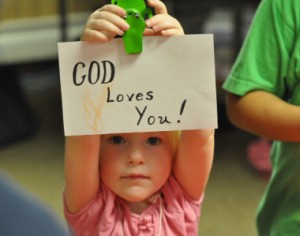 "God is love (1 John 4:8b)". And He loves YOU.
"God is love (1 John 4:8b)". And He loves YOU.
Have you ever watched a parent scoop up their child to snuggle, just because they just can't get enough of the little one? Well, that parent is God. And that child is you.
He loved us first: "For God so loved the world that He gave His only Son. . .(John 3:16)." The felt sense of this truth first moves our hearts, inspiring us to then love Him in return and seek out His will. Our acceptance of His love, so glorious that it defies description, yet so deeply personal that no two people ever experience it the same, grounds our discernment in truth. Knowledge of God's love is the canvas onto which all holy choices are painted.
Knowing, feeling, experiencing the love of another is as essential to the life of our soul, as air, water, and food is to the body. A recent article in Psychology Today tells us: "Babies who are not held and nuzzled and hugged enough will literally stop growing and--if the situation lasts long enough, even if they are receiving proper nutrition--die."*
Mary Magdalene's clinging to the Resurrected Jesus, outside His empty tomb, is the grasp of every human being who has ever found real love. To be in the full presence of Love Itself is to die to any other need or desire and want nothing more.
Yet even with our intrinsic and fierce need to be loved, many Christians do not experience, feel, or know God's immeasurable love for them. Without this essential lifeline to God, personal discernment of God's desires can skew and warp under the strain of a heart, starved for God's life-giving rays. If we don't find love in God, we're going to look for it somewhere else less trustworthy. If we don't feel loved by God, the practice of faith becomes arduous, sometimes even scary, with no place to lay our head and rest our weary mind and heart. If we don't see God as pure love, then we can't completely trust Him, and therefore cast Him off into the distant parameters of our lives, inviting Him in only when necessary, or worse, turning our anger toward Him, secretly seeing Him as the enemy.
One prominent hindrance to our perception of God as love lies in our projection of one or both of our parents or primary caregivers, onto the character of God.
When we were children, our primary caregivers equaled our world. The owners of the hands and voices that fed and cared for us, when we were infants, had almost complete control over whether we lived or died. They helped us to grow, introduced us to the world, shaped our personality, and instilled within us comfort or fear, acceptance or rejection, or a tangled confusion of mixed signals. Those people were like God to us. And now, sometimes, in our unconscious mind, God is like them.
If, for instance, the qualities of our earthly father blended with the true character of God the Father, who is kind, loving, merciful, just, fair, capable, powerful, wise, selfless, faithful, awe-inspiring, humorous, humble, respectful, protecting, nurturing, consistent, patient, long-suffering, trustworthy, holy, righteous, and always there, then accepting the love of God the Father might come as easy as accepting a canteen of cool water in a parched desert.
But if our father was inconsiderate, selfish, judgmental, punishing, unforgiving, unstable, untrustworthy, exacting, punishing, absent, fickle, addicted, high, drunk, angry, disrespectful, abandoning, abusive, untruthful, uncaring, aloof, cold, sporadic, abusive, dangerous, impatient or simply not there, then jumping into the arms of our Father in Heaven for comfort comes as easy as throwing ourselves onto a rusty bed of nails.
Our mother's personality can be projected onto God, as well, and onto the Blessed Mother. And if we had or have two parents or caregivers, neither of whom showed us love, we needn't fear. God will come to us Himself, especially if we turn our souls towards His light, and He will give us an entirely new experience of what love is.
A friend of mine, who felt terribly unhappy growing up with a raging alcoholic father and a heartless mother, and who was molested for seven years by her father's good friend--a Methodist youth minister, said this about how she discovered God's love:
"I started going to the Catholic Church in a desperate search for safety. Even though I did not understand Catholicism and didn’t believe in its moral teachings, I somehow grasped that God was there. It was part of my childhood—the only thing I knew. I walked back into the Catholic Church, and for the first time, God revealed himself to me personally—as love. As I sat in the pew, Jesus, Himself, began talking to me sweetly in my soul. I didn’t know, at the time, how unusual it was to actually hear His voice. When He spoke, I felt His great, yet gentle passion for me, which stirred in the center of my chest. Before then, I didn’t know what it felt like to be loved. I didn’t think such intimacy was possible from the Lord—His feelings for me were so warm and personal and traveled so deep into my soul, reaching places I didn’t know lived inside of me. I had always thought of God as angry, far away, judging, keeping track of my wrongs and metering out just punishment. I never knew he was sweet!—possessing a sweetness so intense, it sometimes scared me.
Because Jesus’ Incarnation was male, when I felt His love piercing my heart, at times it sparked an irrational fear that the intimacy would turn into abuse. The words “I love you” from the man who molested me meant the precursor to something ugly, so when Jesus drew intimately close, I felt scared and asked his mother, Mary, to keep me safe. But with gentle kindness, Jesus always reassured me He would never, ever hurt me. Through His words, He guided me with great care, like an adoring father with his toddler girl."
Whenever bad things happen to us, God never rejoices. Far from it. He suffers, He bleeds, He writhes on the cross, along with us, and with any terrible event, inserts Himself directly into the midst of it, taking all the poisoned arrows into Himself that he possibly can. And if some of the arrows hit us, He immediately comes to our aid to console, heal, encourage, support, and guide. A God who likes to see a child beaten, or a loving single mother of five suffer an untimely death, is no God at all. There is a fallen angel who rejoices in such things, and his name is Satan. He hides behind the scenes, blocked from the consciousness of the masses, instigating all the evil in the world; then once evil happens, he whispers in our ears that God is to blame for it. And we fall for this lie, all the time! But when we push God away and blame the only source of love and light in the there is, what are we left with? Who lives outside the love and light of God? What company do we now keep?
A woman named Sarah, who also suffered through a brutal childhood, used to come to me for spiritual direction. Brought up by a physically, verbally, and emotionally abusive mother, who singlehandedly raised her and her four young siblings, because her father abandoned the family, Sarah found a home in the Catholic Church. But she struggled to see God as love. Then one day, she said to me, beaming, "I just had the most extraordinary experience at Mass!" While there, she realize that she had always blamed God for her terrible upbringing, and made her earthly father out to be the good parent in her life. But this was only a shield of denial she used, when growing up, to protect her heart. Her mother had always spoken harshly of her father, but Sarah defended him as good, out of a sincere need to have at least one good parent. Then in her adult life, Sarah suddenly realized, "My father wasn't good. My father abandoned my mom, and me, and my siblings, and never did anything for us, leaving us in poverty and misery! My father did this to us, not my Heavenly Father!" With this realization, scales fell from her eyes, and a hard shell broke away from her heart. While sitting in Mass, staring upward at a majestic image of God the Father, streaming rays of love emanated from Him and washed through her in waves of ecstasy, causing her heart to soar and almost burst with an expansive, sweet love.
As a good Father, God looks down upon His children with a love far more vast and intimate than any parent has ever had for their child.
As a good Father, He longs to embrace His children and tell them He loves them.
As a good Father, He delights in spoiling His children with little gifts of love.
As a good Father, He desires to show His children the safest and surest path for them to walk.
As a good Father, He looks to the future for His children and hopes that it will bring the best for them.
As a good Father, He lets His children walk their own way, but gives His loving advice to guide them.
As a good Father, He is hurt when His children are hurt. He is sad when His children are sad, and He grieves when His children do wrong.
As a good Father, He always forgives them.
As a good Father, He always looks to bring His children home and waits for His children to come to Him.
As a good Father, He always wonders when the next visit will be and longs for His children's love.
As a good Father, He waits patiently for the day His children overcome their selfishness and become the true persons He knows them to be.
As a good Father, He longs for the day when His children come home safely, and are forever in His arms.
My three year old will run off and play, exploring the world, and then come running back to me and hold my leg. Then he'll venture off again, looking back, every so often, to make sure I'm still there, and run back again to hold my leg. I love it when he does that. I love to feel the pressure of his little body, and his cute pudgy arms clinging to me. He knows I'm safe. He knows I'm there. He knows I love him.
*"Born for Love: Empathy, the Brain, and Human Connections," by Szalavits and Perry, Psychology Today: March 1, 20110. http://www.psychologytoday.com/blog/born-love/201003/touching-empathy
Copyright 2012 Christine Watkins
About the Author

Christine Watkins
Christine Watkins, inspirational speaker and author, was saved from death and atheism, through a miracle of divine grace. She is the founder of QueenOfPeaceMedia.com, the author of TRANSFIGURED: Patricia Sandoval's Escape from Drugs, Homelessness, and the Back Doors of Planned Parenthood and Full of Grace: Miraculous Stories of Healing and Conversion through Mary’s Intercession. See ChristineWatkins.com, and visit QueenOfPeaceMedia.com.


.png?width=1806&height=731&name=CatholicMom_hcfm_logo1_pos_871c_2728c%20(002).png)
Comments